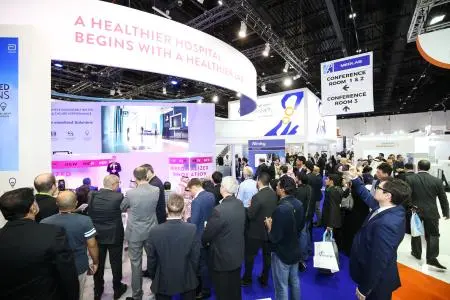PHOTO
· More than a half of GCC residents claim their doctors don’t need laboratory test results to diagnose them, reveals survey commissioned by MEDLAB 2018
· 67% of survey respondents said their doctors explain and interpret laboratory results prior to commencing their treatment plans
· Two thirds of GCC residents believe that laboratory tests can help determine their unborn child’s health
Dubai, United Arab Emirates – A study commissioned by MEDLAB, the largest laboratory expo and congress worldwide, reveals that 55% of GCC residents believe that their doctors can diagnose them without clinical laboratory results, indicating that the vast majority of people still have minimal awareness about the role clinical laboratories play in the comprehensive process of diagnosis, and ultimately treatment.
Commenting on the survey results, Dr. Maroun El Khoury, Consultant Oncologist and Haematologist at American Hospital Dubai and Chair of the Oncology Conference at MEDLAB 2018 stated, “We live in a time where lab results guide majority, if not all of our medical decisions. They allow us to provide patients with personalised treatment plans and open new windows to health and wellness. Today, laboratory professionals are playing an increasingly important role in the healthcare ecosystem. Right from early detection and diagnosis of a disease to individualised treatment plans based on a person’s genetic make up, clinical laboratory testing is integral to improving healthcare quality.”
Majority of people across the world and in the GCC don’t have a medical background that would allow them to understand all complexities of healthcare issues. That is why most rely on their doctors to inform and educate them. However, practice is often different from necessity. Namely, the survey has shown that only 67% of respondents have been in the situation where their doctors explained laboratory results to them, prior to commencing their treatment.
Based on his medical expertise, Dr. Mohamed Hassanein, Consultant Endocrinologist at Dubai Hospital and speaker at the Endocrinology Conference at MEDLAB 2018, stated: “I believe its critical to provide patients with test results. Not only does it engage them, but also helps them understand their condition better, especially with a disease such as diabetes. Leaving patients wondering about test results, especially those ordered to evaluate symptoms that led the patient to see the doctor in the first place, can result in anxiety and misunderstanding.”
Anxiety can be the most pronounced when parents are expecting a new baby. Fetal medicine deals with the assessment of fetal growth and wellbeing, the maintenance of fetal health and the diagnosis of fetal illness and abnormalities. Therefore, pre-natal laboratory testing has an extremely significant role in helping both gynaecologists and parents navigate pregnancy and bringing the baby to the full term. Nonetheless, only 66% of survey respondents in the GCC think that laboratory tests can help determine the health of their unborn child.
Dr. Saad Ghazal Aswad, Senior Consultant Gynecological Oncologist at Tawam Hospital and Chair of the 10th Annual Obs-Gyne Congress, a part of MEDLAB 2018 stated: “As medical professionals we need to do more and educate our patients to further increase the awareness about pre-natal laboratory testing. Namely, pre-natal testing is essential in identifying birth defects and genetic diseases in unborn babies and helps parents make the most informed healthcare decisions both before and after the child is born.”
Tom Coleman, Group Exhibition Director of MEDLAB Series stated: “In its 17th edition, MEDLAB 2018 will feature an increased focus on how laboratory tests are changing the healthcare sector. There has been a growing awareness across the region about the importance of clinical testing, however, we still have many challenges ahead. Key players within the healthcare sector should do more to bridge the gap between clinicians and laboratory professionals in order to better serve their communities. The role of the MEDLAB Congress in this aspect is to provide a platform to all medical professionals to exchange the know-how and identify new collaboration models.”
The survey was conducted by YouGov in December 2017, with over 2,700 participants from across the GCC.
– Ends–
About MEDLAB
www.medlabme.com
As the world’s largest medical laboratory exhibition and congress, MEDLAB provides a platform for laboratory industry leaders, including manufacturers, dealers and distributers, to share best practice, showcase new innovations, collaborate and network.
MEDLAB stems from 15 years of growth alongside the MENA region's largest healthcare event, Arab Health. Moving into its 2nd year as a stand-alone show given its vigorous growth, this annual laboratory meeting brings together exhibitors and attendees from 130+ countries thus giving them the opportunity to present the latest innovations, as well as access cutting-edge laboratory products and services.
A focus point of MEDLAB is its 17 CME-accredited multi-disciplinary conference tracks covering topics such as laboratory management, molecular diagnostics and clinical chemistry. This year's congress will introduce five new clinical tracks, covering Cardiology, Endocrinology, Oncology and more in the efforts to bridge the gap between laboratory professionals and clinicians.
MEDLAB will take place from 5 - 8 February 2018 at the Dubai International Convention & Exhibition Centre, Dubai, UAE.
Website: www.medlabme.com
Facebook: www.facebook.com/medlabseries
Twitter: @MedlabSeries #MEDLABme
© Press Release 2018



















